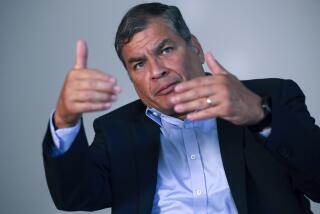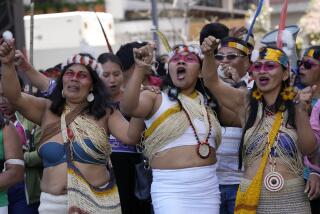Ecuador Facing Economic Crisis
- Share via
QUITO, Ecuador — Besieged President Jamil Mahuad, struggling to keep the economy afloat and stop the currency from sinking, came under more pressure to quit Friday when oil workers announced a strike against him.
Workers from the state oil company Petroecuador announced a strike beginning Jan. 17, giving Mahuad another headache on top of a trade union day of protest Thursday, another due Wednesday and rallies by indigenous groups next Saturday.
“We will begin striking for an indefinite period of time until we get President Jamil Mahuad to resign,” said Petroecuador union leader Enrique Barros. “All 4,500 workers for Petroecuador will participate.”
Mahuad, a Harvard-educated 50-year-old lawyer and previous mayor of the capital, Quito, imposed a state of emergency Thursday in the face of snowballing opposition. His government vowed that he would “stand firm” against “subversive or conspiratorial” movements.
The emergency decree gives Mahuad special powers to deploy police and troops and ban rallies. But protests already got out of hand Thursday when demonstrators clashed with police, who fired tear gas. About 10 people were hurt and 49 arrested.
Ecuador’s sucre currency also is out of control. It finished the first working week of 2000 down 17%, after diving 67% through a disastrous 1999.
Financial markets hoping for Central Bank measures to prop up the sucre were disappointed when Ecuador announced Wednesday, and repeated Friday, that it would stick to a free-floating exchange rate system in place since last February.
“It’s not a matter of introducing rushed, crazy measures,” Central Bank Chief Virginia Fierro said. “We will maintain a free exchange market.”
Markets had hoped for a cure in the form of dollarization or a fixed exchange rate. But the International Monetary Fund, with whom Ecuador is negotiating a key loan package for access to $250 million that would facilitate loans from other bodies, asked Mahuad this week to stick to agreed economic policies.
The IMF’s deputy managing director, Stanley Fischer, said in Washington on Friday that talks with Ecuador were making progress, but he recommended: “It will be important to try to stabilize the currency, and that will require a return of confidence.”
But many of the poor Andean country’s 12.4 million people seem to be losing patience, with unemployment at 17%, the highest inflation in Latin America at 60.7%, and the economy expected to contract in 1999 by 7.3%.
Economic woes were compounded by destructive El Nino storms in 1998 and weak prices for oil and bananas, which, along with shrimp and flowers, are among its most important exports.
Ecuador is the world’s top banana exporter as well as Latin America’s fourth-largest exporter of crude oil and sixth-largest producer. About 50% of its economy depends on its oil exports.
Economic analysts said that without special measures to support the sucre, the outlook for Ecuador is grim.
“Keeping the floating exchange rate means keeping on course for Ecuador’s economy to sink,” said ex-Finance Minister Pablo Concha. “It means continued uncertainty, nervousness and lack of credibility.”
“People had hoped for something concrete,” former Central Bank Chief Eduardo Valencia said. “The level of mistrust in the country goes beyond the Central Bank. It is mistrust of the political system and its institutions.”
More to Read
Sign up for Essential California
The most important California stories and recommendations in your inbox every morning.
You may occasionally receive promotional content from the Los Angeles Times.













